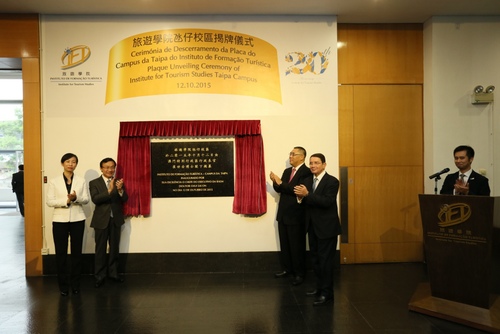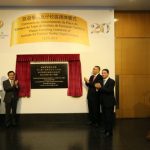 Chief Executive of Macao SAR hosts plaque unveiling ceremony to inaugurate IFT new Taipa campus
Chief Executive of Macao SAR hosts plaque unveiling ceremony to inaugurate IFT new Taipa campus
On 12 October, Institute for Tourism Studies (IFT) held a plaque unveiling ceremony to inaugurate its new Taipa campus at the former University of Macau Library. Chief Executive of Macao SAR, Dr. Chiu Sai On, with the witness of Dr. Alexis Tam Chon Weng, Secretary for Social Affairs and Culture of Macao SAR, and Dr. Taleb Rifai, Secretary General of United Nations World Tourism Organization (UNWTO), unveiled the plaque to inaugurate the new Taipa campus of IFT. The ceremony was also witnessed by the Institute’s staff, students, guests and partners from Macao and overseas, marking an important milestone for the Institute as it is given better conditions to uphold its mission to provide quality education and training. Macao SAR Government has granted IFT the former University of Macau Library, the Staff Quarter building, two laboratories, in addition to the East Asia Hall being granted earlier. The new premises enable IFT to offer a better and more spacious and interactive teaching and learning environment. More programmes and professional courses can be planned to respond to the needs of the industry and the changing industry environment. More local and international students and scholars can also be welcome to further enhance the Institute’s multi-cultural teaching, research and learning environment. New training facilities including a training hotel will be incorporated in the new campus for training and practice. All these serve the ultimate goal of enhancing tourism education and training in Macao, so as to develop competent industry professionals and leaders who will help realise Macao’s vision to become a World Centre for Tourism and Leisure. During the Global Tourism Economy Forum earlier today (12 Oct), Macao SAR Government and United Nations World Tourism Organization (UNWTO) signed a Memorandum of Understanding, to establish a Global Centre for Tourism Education and Training through the involvement of IFT. Once the Global Centre for Tourism Education and Training is set up, both parties will work together to implement projects that include delivering training and education programmes, carrying out joint tourism research projects, and offering technical placement and internship opportunities. The objective of the Centre is to enhance the quality of human capital and increase the competitiveness of tourism destinations (particularly in the Asia Pacific Region) in order to achieve sustainable tourism development in long run. It is hoped that this collaboration will further strengthen Macao’s position as a well-developed tourism destination and will capitalise on Macao’s expertise in tourism education. With the improved conditions provided to IFT, it is believed that the project will achieve the intended results. Established in 1995, the Institute for Tourism Studies offers the most extensive selection of tourism and hospitality related bachelor degree programmes in Macao, and about twenty thousand participants attend its vocational and professional training courses annually. IFT collaborates with 85 universities and tourism organisations around the world, and builds strong links with 500 leading tourism and hospitality corporations to offer internship opportunities to its students. Being the first institution accredited by the UNWTO.TedQual Certification System for tourism education, IFT has the most bachelor degree programmes certified under the System of any tertiary education establishment worldwide. IFT has received the Medal of Merit in Tourism from the Macao SAR Government, and won twice the Gold Award in ‘Education and Training’ from the Pacific Asia Travel Association (PATA).


